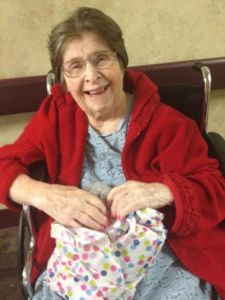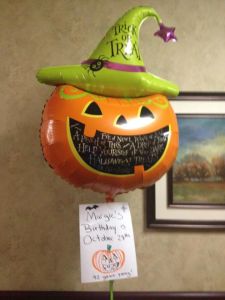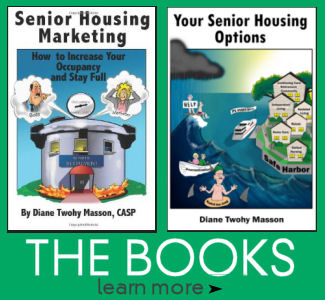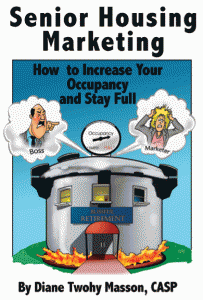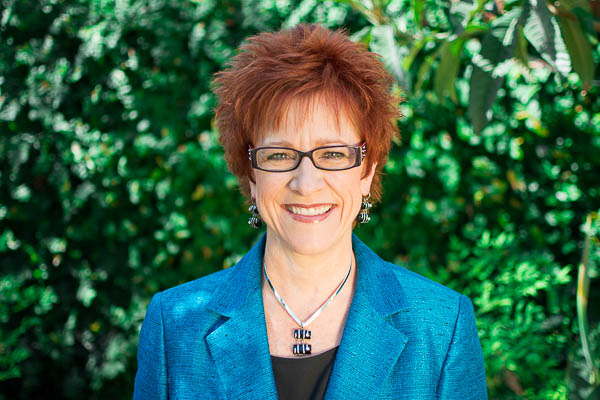Marketing 2 Seniors | The Blog
with Author: Diane Masson
Thanksgiving Week Phone Calls?
 This is the best time of year to make your database calls. Seniors open up about whether their family really visits with them or not. Call your prospective residents this week (not on Thanksgiving) and simply wish them a Happy Thanksgiving! Then you casually ask if they have any plans for Thanksgiving. The truth pours out of the senior. If they have nothing happening, invite them to your community for a wonderful dining experience in the next week. Most of them say, “Yes!”
This is the best time of year to make your database calls. Seniors open up about whether their family really visits with them or not. Call your prospective residents this week (not on Thanksgiving) and simply wish them a Happy Thanksgiving! Then you casually ask if they have any plans for Thanksgiving. The truth pours out of the senior. If they have nothing happening, invite them to your community for a wonderful dining experience in the next week. Most of them say, “Yes!”
Please share any tips that have worked for you!
Wishing you all a happy Thanksgiving with your family and friends!
Diane Twohy Masson is the author of “Senior Housing Marketing – How to Increase Your Occupancy and Stay Full.” It is rated by Amazon Editors as one of the best books of 2014 and readers have given it a 5-star rating on Amazon.com. This award winning book is required reading at George Mason University as a part of its marketing curriculum. Within this book, the author developed a sales & marketing method with 12 keys to help senior living providers increase their occupancy. Masson developed this expertise as a marketing consultant, sought-after blogger for senior housing and a regional marketing director of continuing care retirement communities in several markets. She has also been a corporate director of sales and a mystery shopper for independent living, assisted living, memory care and skilled care nursing communities in multiple states. Currently, Masson is setting move-in records as the regional marketing director of two debt-free Continuing Care Retirement Communities in Southern California – Freedom Village in Lake Forest and The Village in Hemet, California. Interestingly, this career started when she was looking for a place for her own mom and helped her loved one transition through three levels of care.
© Marketing 2 Seniors| Diane Twohy Masson 2014 All Rights Reserved. No part of this blog post may be reproduced, copied, modified or adapted, without the prior written consent of the author, unless otherwise indicated for stand-alone materials. You may share this website and or it’s content by any of the following means: 1. Using any of the share icons at the bottom of each page. 2. Providing a back-link or the URL of the content you wish to disseminate. 3. You may quote extracts from the website with attribution to Diane Masson CASP and link https://www.marketing2seniors.net For any other mode of sharing, please contact the author Diane Masson.
Sabotaging Siblings/Children?
 How many of you have worked with a senior who clearly needs to make a move into a senior living community? Maybe she is lonely, not eating nutritiously, no longer driving or desires the social connectivity of liked-minded seniors. The senior is one visit away from selecting an apartment and putting down a deposit. A daughter has already consented that her mom needs the support of your community and is emotional exhausted from helping her mom. The son/brother is coming to town and they want him to put his stamp of approval on this move.
How many of you have worked with a senior who clearly needs to make a move into a senior living community? Maybe she is lonely, not eating nutritiously, no longer driving or desires the social connectivity of liked-minded seniors. The senior is one visit away from selecting an apartment and putting down a deposit. A daughter has already consented that her mom needs the support of your community and is emotional exhausted from helping her mom. The son/brother is coming to town and they want him to put his stamp of approval on this move.
Suddenly, the senior and the daughter become uncommunicative with you. The family is a no-show for the scheduled tour at your retirement community. Your phone calls to reach out to them are unanswered. What happened? Are they okay? Did something happen and maybe the senior is in the hospital?
Most likely the son came into town and sabotaged the deal. “Mom is fine. She does not need to move into an old folks home. It is too expensive. Just keep helping her sis.” Maybe this son is in denial or maybe he is worried that mom might drain his inheritance. Either way, it is a sad circumstance for the mom who will lose out on a better quality of life and the sister who is tired of taking care of mom while raising her own children.
What can you do? How can you handle this situation in the best possible light?
Here is my suggestion: Next time, prepare the mom and sister for the brother’s visit. I would say, “I would love for your son/brother to come see this community and the apartment that you are considering. Just remember, when you tell him that you are thinking of moving here, he might believe you are moving to an old folks home filled with hospital beds. He won’t be able to imagine the lifestyle you will have living here. I think he will be blown away when he sees the 5-star dining room, live entertainment schedule and all the classes that you want to partake in. Let him know that you understand it is hard to believe and ask him to come see it for himself. Let him know how excited you are and that you want him to support your decision.”
Please share in the comment section below how have you handled this situation in the past.
Diane Twohy Masson is the author of “Senior Housing Marketing – How to Increase Your Occupancy and Stay Full.” It is rated by Amazon Editors as one of the best books of 2014 and readers have given it a 5-star rating on Amazon.com. This award winning book is required reading at George Mason University as a part of its marketing curriculum. Within this book, the author developed a sales & marketing method with 12 keys to help senior living providers increase their occupancy. Masson developed this expertise as a marketing consultant, sought-after blogger for senior housing and a regional marketing director of continuing care retirement communities in several markets. She has also been a corporate director of sales and a mystery shopper for independent living, assisted living, memory care and skilled care nursing communities in multiple states. Currently, Masson is setting move-in records as the regional marketing director of two debt-free Continuing Care Retirement Communities in Southern California – Freedom Village in Lake Forest and The Village in Hemet, California. Interestingly, this career started when she was looking for a place for her own mom and helped her loved one transition through three levels of care.
© Marketing 2 Seniors| Diane Twohy Masson 2014 All Rights Reserved. No part of this blog post may be reproduced, copied, modified or adapted, without the prior written consent of the author, unless otherwise indicated for stand-alone materials. You may share this website and or it’s content by any of the following means: 1. Using any of the share icons at the bottom of each page. 2. Providing a back-link or the URL of the content you wish to disseminate. 3. You may quote extracts from the website with attribution to Diane Masson CASP and link https://www.marketing2seniors.net For any other mode of sharing, please contact the author Diane Masson.
New E-Book for Senior Housing Marketing
 New E-book is now available, “Senior Housing Marketing – How to Increase Your Occupancy and Stay Full.”
New E-book is now available, “Senior Housing Marketing – How to Increase Your Occupancy and Stay Full.”
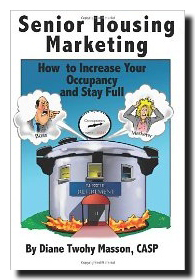 Rated by Amazon Editors as one of the best books of 2014!
Rated by Amazon Editors as one of the best books of 2014!
“Diane’s book is an important resource for the senior housing industry. It contains tips and advice to help the novice, as well as the experienced marketer, build or maintain census. It is also a terrific guidebook for executive directors or administrators to use in managing the marketing function.”
— Chris McKenzie, VP Marketing, PR & Communications, multi-site CCRC organization
“Smart senior housing professionals understand that full occupancy means better cash flows and an improved bottom line. Diane’s practical, relevant strategies and tactics are must read material for any senior housing professional wanting insight on how to best fill and maintain full occupancy at their community. Presented in a positive and direct manner, this book is full of useful information delivered straight from the front line.”
— Richard M. Mazza, senior housing consultant, development & finance professional; former Chief Accounting Officer and Interim CFO
“A useful guide for both non-profit and for-profit senior housing organizations, with checklists, ideas, and reminders of essential elements all good managers and sales people need to be effective in filling senior living homes and apartments. Diane’s techniques can bring immediate results.”
—Thomas Becker, retired CEO & President of Pacific Retirement Services
There are 14 more testimonials on Amazon. If this book has helped you or your organization, please share your experience on Amazon or in the comment section below.
Diane Twohy Masson is the author of “Senior Housing Marketing – How to Increase Your Occupancy and Stay Full,” available at Amazon.com with a 5-star rating. The book is required reading at George Mason University as a part of its marketing curriculum. Within this book, the author developed a sales & marketing method with 12 keys to help senior living providers increase their occupancy. Masson developed this expertise as a marketing consultant, sought-after blogger for senior housing and a regional marketing director of continuing care retirement communities in several markets. She has also been a corporate director of sales and a mystery shopper for independent living, assisted living, memory care and skilled care nursing communities in multiple states. Currently, Masson is setting move-in records as the regional marketing director of two debt-free Continuing Care Retirement Communities in Southern California – Freedom Village in Lake Forest and The Village in Hemet, California. Interestingly, this career started when she was looking for a place for her own mom and helped her loved one transition through three levels of care.
© Marketing 2 Seniors| Diane Twohy Masson 2014 All Rights Reserved. No part of this blog post may be reproduced, copied, modified or adapted, without the prior written consent of the author, unless otherwise indicated for stand-alone materials. You may share this website and or it’s content by any of the following means: 1. Using any of the share icons at the bottom of each page. 2. Providing a back-link or the URL of the content you wish to disseminate. 3. You may quote extracts from the website with attribution to Diane Masson CASP and link https://www.marketing2seniors.net For any other mode of sharing, please contact the author Diane Masson.
Dentistry and Dementia
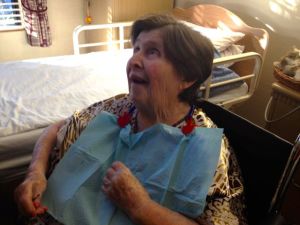 Am I a bad daughter? Yesterday, I learned the shocking truth that my mom has five missing teeth. My mom has lived in a higher level of care for over eight years. Seven years in assisted living in Seattle and the last 17 months in skilled nursing care in California.
Am I a bad daughter? Yesterday, I learned the shocking truth that my mom has five missing teeth. My mom has lived in a higher level of care for over eight years. Seven years in assisted living in Seattle and the last 17 months in skilled nursing care in California.
My mother has had vascular dementia for over 10 years and I have been attending doctor appointments with her for years. Why did I never consider oral health and attending a dentist appointment?
It was pure luck that I visited my mom this week when the mobile dentist was there. Dr. Mark Mroch was awesome. He had a funny and engaging personality. My mom was completely enamored with him. They were joking back and I forth and I was cracking up.
According to dental records the five teeth were missing when my mom arrived in California. Now that I have processed this situation, I have some unanswered dental questions:
- Why did no one tell the POA (Power of Attorney) of a dementia patient that her mom had five teeth missing when it was first discovered?
- Has my mom with her dementia been responsible for her own dental hygiene for all these years?
- Do assisted living and skilled nursing communities brush and floss teeth?
- How often?
- If the senior tells the caregiver that flossing hurts, do they just discontinue flossing and not tell the family?
- Is a dentist required to request flossing in order for it to happen?
Can you please share what the oral hygiene policy is at your assisted living, skilled nursing or memory care community? I know the goal is to have the residents be as independent as possible and brush his or her own teeth. What if they are not doing a good job? When does staff step in to help? Do staff actually watch them brush their teeth or is this one of those back burner items that can get overlooked?
My mom lived in a social model of assisted living. She was borderline skilled nursing for a year or so before we moved her. Is the dental program for dementia different in a social vs. medical model of assisted living?
Please help me figure this out and maybe we can help some POA’s out there who never thought about oral hygiene before. It’s vital that we advocate for our loved one.
Thanks, Diane
Diane Twohy Masson writes this weekly blog to support and engage with other senior housing professionals. Her first book is Senior Housing Marketing – How To Increase Your Occupancy and Stay Full. Many sales teams and organizations have used the 12 keys contained in this book for their weekly book review.
Diane Masson has recently created a New Guide for the Silver Tsunami. Her second book offers a pro-active approach for a senior to navigate his or her way through the senior housing market. “Selecting Senior Housing Options for Seniors IN the Silver Tsunami” is coming soon to Amazon.com. www.tips2seniors.com
© Marketing 2 Seniors| Diane Twohy Masson 2014 All Rights Reserved. No part of this blog post may be reproduced, copied, modified or adapted, without the prior written consent of the author, unless otherwise indicated for stand-alone materials. You may share this website and or it’s content by any of the following means: 1. Using any of the share icons at the bottom of each page. 2. Providing a back-link or the URL of the content you wish to disseminate. 3. You may quote extracts from the website with attribution to Diane Masson CASP and link https://www.marketing2seniors.net For any other mode of sharing, please contact the author Diane Masson.
Dementia Birthday Tip
My mom is going to be 92 years young on Tuesday and she has had vascular dementia for around 11 years. She can’t remember what she had for breakfast, but she still knows my name. Last week when my husband and I went to see her at the Freedom Village Health Care Center she said, “What a surprise, I am happy to see you!” I was so astonished with her welcome. Usually it can take several minutes for her brain to adjust that we are there. We celebrated her birthday month that evening with a snack, gift and watching a movie together. She was 70% cognitively with us and shared some childhood memories.
This week, I was not so lucky. I arrived in the morning with a balloon and a gift from my brother. When I saw her, she was in an anxious mood. I braced myself for an unknown emotional roller coaster. The balloon scared her at first, which shocked me. Then she wanted to read it and soon she was laughing. She told me that it was not a good day, that she could not remember anything and it was all so confusing. I told her that I understood and that it would be okay. She calmed down and then asked what was in the package. I told her it was her birthday gift from my brother Paul. “Is it my birthday?” she asked. I laughed and showed her the sign that I had attached to the balloon. It said, Margie’s birthday is October 28th, she will be 92 years young.
I set the balloon next to her and everyone who walked by wished her a happy birthday. It was awesome. My first thought was that every care ambassador and nurse would read the sign and wish her a happy birthday 24-7 for a few days. My second thought was that my mom could read the sign and know that it was her birthday week. I helped her open the gift of a new sweater. She loved the texture, because it was so soft. The card enamored her most and she kept looking at it and opening and closing it. With all the pictures on it, I realized that it was so busy that she could not focus on what my brother and sister-in-law had written inside. So I read it to her several times. She loved it.
When I saw her on my next visit, she was agitated with red spots on her checks. She was relieved to see my familiar face. After several minutes of my speaking soothing comments, she came back to me mentally. Then she asked if I had any food. I always bring food, because food can have a calming effect on her. I produced a banana from my purse and her eyes lit up. “For me?” she said. I laughed and said, “Yes!” I opened it and she said that she wanted to hold it. Sometimes she wants me to hold it and she breaks off part of the banana. I have learned to go with flow and to accept the not good days or moments that adjoin laughter and happier days.
Happy birthday month Mother!
Diane’s number one tip for those who have a loved one with dementia is to expect the unexpected. You may want to celebrate their birthday on the actual day, but that may not be a good day for your loved one with dementia. Be flexible and have a willingness to celebrate their special day on another day or just have a birthday month celebration for them and you are sure to hit one good day. Stay calm and be soothing to your loved one. Don’t ask someone with dementia a lot of questions, they can’t process them. Just let them talk to you about what is on their mind. They might want to talk about their childhood or the depression. Adapt to them and go with the flow.
Diane Masson’s new guide book for seniors, “Selecting Senior Housing for Seniors in the Silver Tsunami,” will be will be coming soon to Amazon.com. If you sign up for my weekly newsletter on the right side of this blog, you will be notified when my new book becomes available. Check out my new website: Tips2Seniors.com or please follow me on Facebook.
Hiring a Caregiver “Under the Table”
 Potentially a senior can save significant money by hiring a companion recommended from church or their neighbor’s friend who has been out of work. It’s a win/win for everybody – right? Wrong! What is their recourse if this win/win situation starts going badly? There is no boss or company where they can voice concerns.
Potentially a senior can save significant money by hiring a companion recommended from church or their neighbor’s friend who has been out of work. It’s a win/win for everybody – right? Wrong! What is their recourse if this win/win situation starts going badly? There is no boss or company where they can voice concerns.
Last week, I attended the Care Revolution Conference in Anaheim, CA and met over 20 home care company owners and managers. One manager shared that the majority of her potential caregiver applicants do not pass the drug screening. I was shocked. Another home care owner shared that 40% of the remaining applicants don’t pass the criminal background check. Reputable agencies have a vetting process so a senior can have confidence about who is in their home providing care.
Home care owners shared with me that seniors who hire a caregiver “under the table,” become employers and are responsible for taxes and social security of their employee. Seniors should check with their accountant and consider the ramifications of paying quarterly taxes for an employee. Initially, it may sound like a bargain to pay a caregiver “under the table.” Seniors need to consider the long-term financial consequences and legalities. It seems crazy to me that a senior needing help would become an employer and have to pay quarterly taxes.
If a caregiver claims a work injury while working for a senior, costs can climb upwards to $300,000 after surgery, therapies and loss time from work. Some caregivers work for multiple companies, so one never really knows if the injury was from working for the senior or another employer.
Here’s a shout out to those reputable home care companies who provide great care to seniors! I had no idea how hard it was for you to find and hire quality caregivers.
This is an excerpt from my new guide book for seniors, “Selecting Senior Housing for Seniors in the Silver Tsunami.” It will be coming soon to Amazon.com. If you sign up for my weekly newsletter on the right side of this blog, you will be notified when my new book becomes available. Check out my new website: Tips2Seniors.com or please follow me on Facebook
Photo credit to Moretimeforyou.com
Diane Twohy Masson writes this weekly blog to support and engage with other senior housing professionals. Her first book is Senior Housing Marketing – How To Increase Your Occupancy and Stay Full. Many sales teams and organizations have used the 12 keys contained in this book for their weekly book review.
© Marketing 2 Seniors| Diane Twohy Masson 2014 All Rights Reserved. No part of this blog post may be reproduced, copied, modified or adapted, without the prior written consent of the author, unless otherwise indicated for stand-alone materials. You may share this website and or it’s content by any of the following means: 1. Using any of the share icons at the bottom of each page. 2. Providing a back-link or the URL of the content you wish to disseminate. 3. You may quote extracts from the website with attribution to Diane Masson CASP and link https://www.marketing2seniors.net For any other mode of sharing, please contact the author Diane Masson.
Sugar Addict Seniors?
 Does every assisted living and skilled nursing community in America serve a dessert to their residents for lunch AND dinner? Is this too much sugar? Can sugar cause or increase dementia and Alzheimer’s?
Does every assisted living and skilled nursing community in America serve a dessert to their residents for lunch AND dinner? Is this too much sugar? Can sugar cause or increase dementia and Alzheimer’s?
My mom lived in assisted living for 7 years and had desserts twice a day. Now, she has lived in skilled nursing for 17 months with desserts twice a day and don’t forget the occasionally ice cream snack or the birthday party with cake. She has progressed over nine years from some memory loss to full blown vascular dementia. Was it life, genes or could sugar have helped it along? What is your opinion?
Fact: It is very hard for me to walk away from a good piece of chocolate. I am a sugar addict. Then I started reading about sugar causing inflammation in the body according Dr.Daniel Amen and how sugar can lead to dementia according to New York Times’ best selling author David Perlmutter, MD. When I started eating more that 12 pieces a day, I decided to give up sugar.
Every month, I am a presenter at four or more marketing luncheons for prospective residents. The lunches are outstanding and always end with a spectacular dessert. This week it was a cheesecake with strawberry sauce. I said no thank you. As the excellent servers are glancing around and notice that I don’t have a dessert, they come over to offer me one again. Sometimes I have had to say no to dessert three times at one luncheon. It is tough to give up sugar!
Temptation is everywhere! There is always a birthday celebration with cake, candy in the office, bakeries and here comes Halloween candy. Do you nibble or eat as much as possible? Do think it will cause us to have dementia sooner?
How many of us working folks eat two desserts every day? Is it bad that we feed two desserts to our seniors with dementia twice a day in our assisted living and skilled nursing care communities?
Diane Twohy Masson writes this weekly blog to support and engage with other senior housing professionals. Her first book is Senior Housing Marketing – How To Increase Your Occupancy and Stay Full. Many sales teams and organizations have used the 12 keys contained in this book for their weekly book review.
Diane Masson has recently created a New Guide for the Silver Tsunami. Her latest book offers a pro-active approach for a senior to navigate his or her way through the senior housing market. “Selecting Senior Housing Options for Seniors IN the Silver Tsunami” is coming soon to Amazon.com. www.tips2seniors.com
© Marketing 2 Seniors| Diane Twohy Masson 2014 All Rights Reserved. No part of this blog post may be reproduced, copied, modified or adapted, without the prior written consent of the author, unless otherwise indicated for stand-alone materials. You may share this website and or it’s content by any of the following means: 1. Using any of the share icons at the bottom of each page. 2. Providing a back-link or the URL of the content you wish to disseminate. 3. You may quote extracts from the website with attribution to Diane Masson CASP and link https://www.marketing2seniors.net For any other mode of sharing, please contact the author Diane Masson.
Need an Attitude Adjustment in 25 Seconds?
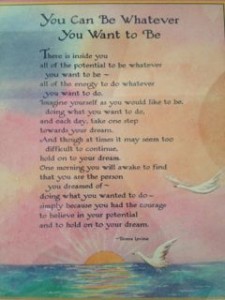 Today, I want to share an inspirational poem that I have read continually since my college days:
Today, I want to share an inspirational poem that I have read continually since my college days:
You Can Be Whatever You Want To Be
There is inside you
all the potential to be whatever
you want to be ~
all of the energy to do whatever
you want to do.
Imagine yourself as you would like to be,
doing what you want to do,
and each day, take one step
towards your dream.
And though at times it may seem too
difficult to continue,
hold on to your dream.
One morning you will awake to find
that you are the person you dreamed of ~
doing what you wanted to do ~
simply because you had the courage
to believe in your potential
and to hold on to your dream.
~ Donna Levine
I hope this poem inspires you! You have the capabilities inside you to change the world in our wonderful profession. I am thankful that I help seniors every single day. Tip: Read it out loud, it goes into your subconscious brain faster.
Diane Twohy Masson is the author of “Senior Housing Marketing – How to Increase Your Occupancy and Stay Full,” available at Amazon.com with a 5-star rating. The book is required reading at George Mason University as a part of its marketing curriculum. Within this book, the author developed a sales & marketing method with 12 keys to help senior living providers increase their occupancy. Masson developed this expertise as a marketing consultant, sought-after blogger for senior housing and a regional marketing director of continuing care retirement communities in several markets. She has also been a corporate director of sales and a mystery shopper for independent living, assisted living, memory care and skilled care nursing communities in multiple states. Currently, Masson is setting move-in records as the regional marketing director of two debt-free Continuing Care Retirement Communities in Southern California – Freedom Village in Lake Forest and The Village in Hemet, California. Interestingly, this career started when she was looking for a place for her own mom and helped her loved one transition through three levels of care.
© Marketing 2 Seniors| Diane Twohy Masson 2014 All Rights Reserved. No part of this blog post may be reproduced, copied, modified or adapted, without the prior written consent of the author, unless otherwise indicated for stand-alone materials. You may share this website and or it’s content by any of the following means: 1. Using any of the share icons at the bottom of each page. 2. Providing a back-link or the URL of the content you wish to disseminate. 3. You may quote extracts from the website with attribution to Diane Masson CASP and link https://www.marketing2seniors.net For any other mode of sharing, please contact the author Diane Masson.
Gluten Free and Vegetarian Seniors
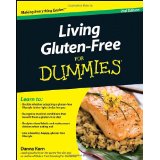 Are you hearing about more and more seniors who are either vegetarians or need a gluten-free diet? How are your chefs and dining directors accommodating these new dietary restrictions at your senior living communities? Do these diet-restricted seniors have more than one choice for lunch and dinner at your retirement community? Or are they stuck with the salad of the day or a vegetable plate?
Are you hearing about more and more seniors who are either vegetarians or need a gluten-free diet? How are your chefs and dining directors accommodating these new dietary restrictions at your senior living communities? Do these diet-restricted seniors have more than one choice for lunch and dinner at your retirement community? Or are they stuck with the salad of the day or a vegetable plate?
Let’s hear what is happening in our senior living industry on a nationwide basis. Join the conversation at the bottom of this blog.
Younger seniors want choices. My Continuing Care Retirement Communities offer 14 entrees, which include vegetarian and gluten-free options. The culinary and serving teams have been trained to accommodate five gluten-free residents at one community. There can be no mishap because a gluten-free senior can get deathly ill if even a crumb of gluten is on their portion of food.
Soups that used to be made with a flour-based rue have been replaced with gluten-free options. A gluten-free pasta dish is always one of the 14 entrees. New gluten-free rolls and deserts are available now.
What are you doing to accommodate seniors with dietary restrictions? Have you had to expand beyond the standard three entrees a night? Please share what dietary changes you have made at your senior living community.
Photo credit: Living Gluten-Free for Dummies
Diane Twohy Masson writes this weekly blog to support and engage with other senior housing professionals. Her first book is Senior Housing Marketing – How To Increase Your Occupancy and Stay Full. Many sales teams and organizations have used the 12 keys contained in this book for their weekly book review. Diane is working on her second book to help seniors select their senior housing options. Masson enjoys setting move-in records as the regional marketing director of two debt-free Continuing Care Retirement Communities in Southern California – Freedom Village in Lake Forest and The Village in Hemet, California.
© Marketing 2 Seniors| Diane Twohy Masson 2014 All Rights Reserved. No part of this blog post may be reproduced, copied, modified or adapted, without the prior written consent of the author, unless otherwise indicated for stand-alone materials. You may share this website and or it’s content by any of the following means: 1. Using any of the share icons at the bottom of each page. 2. Providing a back-link or the URL of the content you wish to disseminate. 3. You may quote extracts from the website with attribution to Diane Masson CASP and link https://www.marketing2seniors.net For any other mode of sharing, please contact the author Diane Masson.
Machine Gun Versus Interactive Sales Approach
What is your senior living sales style? Are you firing off information about your retirement community like a machine gun or do you have a softer interactive approach with future residents?
How a machine gun senior living sales person thinks:
- It’s very important to give the prospect ALL the information about my community so they can make a good decision.
- I want to help them move in soon.
- I give a great and interesting tour of the community.
- I want to highlight our most popular areas in the community.
- I want them to try our food and then they will move in.
- Prospects are busy, so I have to talk fast and get all the key information out.
- I don’t know why I am not getting more sales, I ask everyone for a deposit.
How an interactive senior living sales person thinks:
- What is the reason they walked in the door of my community today?
- I am genuinely interested in the customer.
- What’s most important for them to know?
- How can I help them?
- Through listening, I can customize the tour for them.
- I’ll highlight the parts of the community that the prospect will utilize.
- Asking questions to learn how my community can solve their problem is important (Are they lonely, have a lack of nutrition, fear of not being found laying on the floor after a fall, home maintenance too much or have a desire for socialization?).
- Once they start visualizing themselves living in the community, they will make a deposit.
What is the one word difference between these two approaches? Listening!
Both types of senior living sales people are hard workers and care about the prospective resident. The difference is that the machine gun approach turns off prospective seniors. A senior wants to be understood and needs someone with compassion and kindness to interactively solve their current dilemma. They did not just walk in your community for the free food, they came in for a reason. Listen and learn the reason.
You may be thinking – I do listen to the customer!
Tip: When you do your next tour, determine if you are listening 90% of the time and only talking 10% of the time. If you can get them to talk about their own current living and lifestyle challenges, they will sell themselves.
Please share your style, strategies, successes, failures or comment below to join the conversation and interact with other senior living professionals on what is currently being effective to increase occupancy on a nationwide basis.
Diane Twohy Masson is the author of “Senior Housing Marketing – How to Increase Your Occupancy and Stay Full,” available at Amazon.com with a 5-star rating. The book is required reading at George Mason University as a part of its marketing curriculum. Within this book, the author developed a sales & marketing method with 12 keys to help senior living providers increase their occupancy. Masson developed this expertise as a marketing consultant, sought-after blogger for senior housing and a regional marketing director of continuing care retirement communities in several markets. She has also been a corporate director of sales and a mystery shopper for independent living, assisted living, memory care and skilled care nursing communities in multiple states. Currently, Masson is setting move-in records as the regional marketing director of two debt-free Continuing Care Retirement Communities in Southern California – Freedom Village in Lake Forest and The Village in Hemet, California. Interestingly, this career started when she was looking for a place for her own mom and helped her loved one transition through three levels of care.

